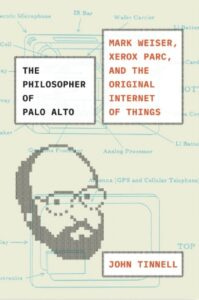Wednesday 27 September, 2023
Magic toadstools
By the banks of the river Corrib in Mayo. And no, I didn’t pick them.
Quote of the Day
“Any word you have to hunt for in a thesaurus is the wrong word.”
Stephen King
Musical alternative to the morning’s radio news
Jelly Roll Morton | Smoke House Blues
Long Read of the Day
Confessions of a Viral AI Writer
Vauhina Vara wrote a story with the assistance of ChatGPT which went viral on the Web. She’s written a thoughtful essay in Wired on whether Generative AI’s are good for writers — or indeed for writing itself.
When the essay, called “Ghosts,” came out in The Believer in the summer of 2021, it quickly went viral. I started hearing from others who had lost loved ones and felt that the piece captured grief better than anything they’d ever read. I waited for the backlash, expecting people to criticize the publication of an AI-assisted piece of writing. It never came. Instead the essay was adapted for This American Life and anthologized in Best American Essays. It was better received, by far, than anything else I’d ever written.
I thought I should feel proud, and to an extent I did. But I worried that “Ghosts” would be interpreted as my stake in the ground, and that people would use it to make a case for AI-produced literature.
And soon, that happened…
It’s a thoughtful, thought-provoking piece. And one passage particularly resonated with me,
ChatGPT’s voice is polite, predictable, inoffensive, upbeat. Great characters, on the other hand, aren’t polite; great plots aren’t predictable; great style isn’t inoffensive; and great endings aren’t upbeat.
Yep.
Books, etc.
A must-read (for me, anyway).
From the blurb:
Mark Weiser (1952–99), the first chief technology officer at Xerox PARC and the so-called “father of ubiquitous computing.” But Weiser, who died young at age 46 in 1999, would be heartbroken if he had lived to see the ways we use technology today. As John Tinnell shows in this thought-provoking narrative, Weiser was an outlier in Silicon Valley. A computer scientist whose first love was philosophy, he relished debates about the machine’s ultimate purpose. Good technology, Weiser argued, should not mine our experiences for saleable data or demand our attention; rather, it should quietly boost our intuition as we move through the world.
My commonplace booklet
Samuel Johnson, opsimath
Henry Oliver’s affectionate tribute to the first great lexicographer.
He is mostly remembered because of Boswell’s biography, which details all sorts of weird and wonderful things about him, like the fact that he always kept his orange peel to put in his shoes, or his strange behaviour, twitching and rolling around and muttering, like he had tourettes. People who met him found his intelligence literally unbelievable after they had observed his ‘strange antic gestures’. He also had terrible eyesight and read with the book very close to his face, so close to the candle he scorched his wig. His friend Thrale worried he would set himself on fire.
But he ought to be remembered for his writing and his strong minded independence. He was an autodidact, and a powerful example of the Fitzgerald Rule. Who would have seen the potential in that strange man wandering the streets with Richard Savage, a well known liar and fraud? Only the people who could recognise that he was an opsimath: a lifelong learner and a late bloomer.
He was. Which is why I’ve always admired him and have a copy of his Dictionary on my shelves.
Linkblog
Something I noticed, while trying to drink from the Internet firehose.
20 String Harp Guitar Cover of Neil Young’s ‘Harvest Moon’
And you thought guitars only had 12 strings at most? Me too.





